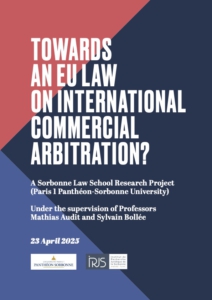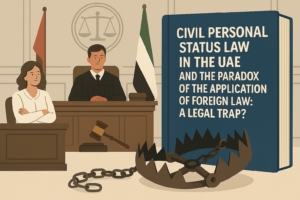Views
According to the French Cour de Cassation, the law applicable to the sub-purchaser’s direct action against the original seller depends on who brings the claim!
Written by Héloise Meur, Université Paris 8
In two rulings dated 28 May 2025, the French Cour de cassation (Supreme Court) ruled on the issue of the law applicable to a sub-purchaser’s direct action in a chain of contracts transferring ownership, under European private international law. The issue is sensitive. The contractual classification under French law —an outlier in comparative law— had not been upheld by the Court of Justice of the European Union (CJEU) to determine international jurisdiction under the Brussels system (CJEU, 17 June 1992, C-26/91, Jakob Handte). Despite CJEU’s position, the Cour de cassation had consistently refused to adopt a tort-based qualification to determine the applicable law (esp. Civ. 1st, 18 dec. 1990, n° 89-12.177 ; 10 oct. 1995, n° 93-17.359 ; 6 feb. 1996, n° 94-11.143 ; Civ. 3rd, 16 janv. 2019, n° 11-13.509. See also, Civ. 1st, 16 jan. 2019, n° 17-21.477), until these two rulings rendered under the Rome II Regulation.
“Towards an EU Law on International Commercial Arbitration?” A Sorbonne Law School Research Project

Written by Dr. Nima Nasrollahi-Shahri (Sorbonne Law School) and Vincent Bassani-Winckler (PhD Candidate, Sorbonne Law School), both authors participated in the Working Group.
A few days ago, the Sorbonne Law School released the final report of a collective research project chaired by Professors Mathias Audit and Sylvain Bollée, entitled “Towards an EU Law on International Commercial Arbitration?”.
Conducted within the IRJS (Institut de Recherche Juridique de la Sorbonne), and more specifically its research group on private international law, SERPI (Sorbonne – Étude des Relations Privées Internationales), this project sets out to examine whether and how to improve the relationship between commercial arbitration and EU law.
Civil Personal Status Law in the UAE and the Paradox of the Application of Foreign Law: A Legal Trap?

I. Introduction (*)
(*) For the sake of simplicity, reference will be made only to Federal Decree-Law No. 41/2022 of 2 October 2022 on Civil Personal Status. The Emirate of Abu Dhabi has enacted a separate law that addresses similar matters at the local level. For a comparison of the various applicable legal frameworks in family law in the UAE, see Béligh Elbalti, “The Personal Status Regimes in the UAE — What’s New and What Are the Implications for Private International Law? A Brief Critical Appraisal”.
There is no doubt that the introduction of the Civil Personal Status Law (CPSL) in the United Arab Emirates marks a significant turning point in the region’s legal landscape, particularly in areas traditionally governed by religious norms. The CPSL refers to the special law adopted at the federal level, which allows family law disputes involving non-Muslims (both foreigners and UAE citizens) to be resolved under a legal framework, that is intended to be modern, flexible, based on “rules of justice and fairness” and “the best international practices from comparative legal systems” (cf. article 19 of the Cabinet Resolution Concerning the Executive Regulation of Federal Decree-Law on the Civil Personal Status). However, the incorporation of the CPSL into the existing legal frameworks in the UAE has raised several issues. These include, among others, the articulation of the CPSL with the other applicable legal frameworks, and more importantly, the extent to which parties may opt out of this “modern” regime in favor of applying their own national laws (for a general overview, see Elbalti, op. cit.). Read more
News
Call for papers: Bridging Jurisdictions: Rethinking Commercial Conflicts of Laws 10 Years After Brexit
by Dr Georgia Antonopoulou (University of Birmingham) and Dr Ekaterina Pannebakker (Leiden University)
On 14 May 2026, the roundtable Bridging Jurisdictions: Rethinking Commercial Conflicts of Laws 10 Years After Brexit will take place at the University of Birmingham, in the UK. This roundtable will focus on highlighting cooperation opportunities in commercial conflicts of laws between the United Kingdom and the EU in light of current developments including jurisdictional competition, digitisation, sustainability, and international sanctions. The roundtable will feature policymakers and internationally renowned scholars.
We invite submissions of draft articles from researchers and academics, especially at their early stages of their careers, on private international law in the aftermath of the Brexit. The applications should be in English. Kindly email your application to Dr E. Pannebakker (e.s.pannebakker@law.leidenuniv.nl) and Dr G. Antonopoulou (g.antonopoulou@bham.ac.uk). The submissions should include:
- an abstract (max. 200 words);
- a draft or a detailed outline of the contribution (max. 5,000 words);
- a bio/curriculum vitae of the author (max. 2 pages long).
The deadline for submission is 1 February 2026. The selected participants will be notified by the end of February 2026.
During the roundtable, the selected participants will give a presentation of their articles and then receive feedback. Accepted papers will be considered for publication in an edited special journal issue in an international review. The roundtable will cover reasonable costs of travel, accommodation, and meals for the selected participants.
Possible topics include:
- Jurisdictional competition including arbitration and international commercial courts;
- PIL in the United Kingdom post-Brexit;
- The impact of digitisation on private international law (applicable law and/or jurisdiction);
- Sustainability and private international law;
- The impact of trade sanctions on private international law.
We particularly welcome applications from underrepresented groups. Special consideration will be given to female participants vested with childcare and/or other domestic responsibilities.
This project has received funding from the Birmingham – Leiden universities Strategic Collaboration Fund.
We are looking forward to receiving your application!


Upcoming European Dialogue on Civil Procedural Law “Recent Developments on Brussels Ibis” Thursday, 4 December 2025 1 pm CET
The next session of the conference series European Dialogue on Civil Procedural Law will take place (online) on Thursday, 4 December 2025, from 13:00 to 17:00 (CET), under the theme “Recent Developments on Brussels Ibis”.
The event is organised by Dr. habil. Balázs Arató, PhD, Prof. Dr. Thomas Garber, Prof. Dr. Katharina Lugani and Prof. Dr. Matthias Neumayr.
The Brussels I bis Regulation, together with its parallel instrument, the Lugano Convention, forms the core of European civil procedure law. Events in this series serve to promote dialogue among Member States and with third countries, thereby strengthening and improving the integration and efficiency of European legal instruments. The interim online conference on 4 December 2025 will feature country reports from four legal systems and two presentations on current topics relating to the Brussels Ia Regulation. The event is aimed at academics and practitioners alike. We look forward to a lively exchange.
The speakers are :
- Dr. habil. Balázs Arató, PhD, Budapest, Hungary
- Dr. Caterina Benini, Università Cattolica del Sacro Cuore, Milan, Italy
- Assoc.-Prof. Dr. Eva Dobrovolná, Ph.D., LL.M., Masaryk University, Brno, Czech Republic
- Prof. Dr. Étienne Farnoux, University of Strasbourg, France, seconded to the Saint Joseph University of Beirut, Lebanon
- Prof. Dr. Thomas Garber, Johannes Kepler University Linz, Austria
- Prof. Dr. Katharina Lugani, Heinrich Heine University Düsseldorf, Germany
- Prof. Dr. Robert Magnus, University of Bayreuth, Germany
- Assoc.-Prof. Dr. Martina Melcher, M.Jur, University of Graz, Austria
- Prof. Dr. Matthias Neumayr, Johannes Kepler University Linz, Austria
- Prof. Dr. Anna Nylund, University of Bergen, Norway
The flyer for the event can be found here.
Please register here.
Participation is free of charge.
HCCH Monthly Update: November 2025
HCCH Monthly Update: November 2025
Conventions & Instruments
On 5 November 2025, Algeria deposited its instrument of accession to the 1961 Apostille Convention. With the ratification of Argentina, the Convention now has 58 Contracting Parties. With the accession of Algeria, the 1961 Apostille Convention now has 128 Contracting Parties. It will enter into force for Algeria on 9 July 2026. More information is available here.
On 27 November 2025, Monaco deposited its instrument of accession to the 2005 Choice of Court Convention. With the accession of Monaco, 38 States and the European Union are bound by the 2005 Choice of Court Convention. The Convention will enter into force for Monaco on 1 March 2026. More information is available here.




